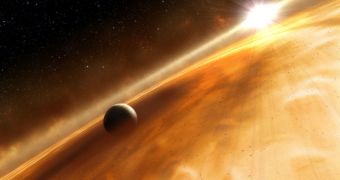Speaking at a recent exoplanet conference in Grand Teton National Park, Wyoming, a team of experts set the international astronomical community ablaze when it reported that the established extrasolar planet Fomalhaut b moved in an unexpected, and theoretically impossible, way.
As dozens upon dozens of exoplanets are being discovered on a monthly basis, one would be tempted to think that the fate of just one planet is not that important. But astronomers have developed an attachment to this particular world, for a number of reasons.
Back in 2008, when the object was discovered, it became the first exoplanet ever to be imaged at visible-light wavelengths. It lies extremely close to Earth, at a distance of only 25 light-years. Experts say that it orbits the star called Fomalhaut, Nature News reports.
Data presented at the conference indicated that the exoplanet was behaving erratically, moving on never-before-seen trajectories that cast doubts as to whether it's actually a planet or not.
The findings were all the more surprising since Hubble Space Telescope observations conducted in 2004 and 2006 revealed that the object was following a textbook orbit around its parent star. Fomalhaut was plowing through a luminous dust ring circling the star.
Astronomers established at the time that the exoplanet played in important role in giving the disk a sharp inner edge, since its gravitational pull was sweeping away the cosmic dust at these coordinates.
But now the planet is passing through the dust disk, as evidenced by the latest images. The announcement was made by University of California in Berkeley (UCB) astronomer Paul Kalas, who was the leader of the 2008 study that analyzed the object.
University of Toronto in Canada astronomer Ray Jayawardhana added that the new data no longer support the idea that Fomalhaut is an exoplanet. “It's quite clear that the original story cannot stand anymore,” he told attendants at the meeting.
But not everyone agrees that the exoplanet should be declassified from its current status. According to Kalas, the evidence against this classification is insufficient. “You have one scientist trying to create a controversy out of nothing,” he said, while admitting that more studies are required for the planet.

 14 DAY TRIAL //
14 DAY TRIAL //